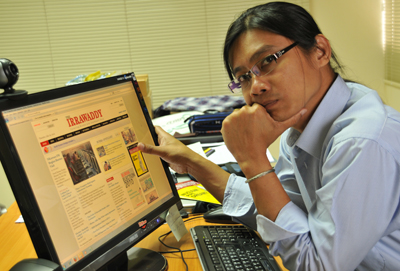Last week, in response to a proposal from Lower House MP Thein Nyunt for a new law to guarantee media freedom, Burmese Information Minister Kyaw Hsan warned that such a law could be more trouble than it was worth. Citing the ancient Buddhist fable of Saddan, the elephant king whose queen was bitten by red ants attracted by flowers that he had given her, he suggested that the “gift” of a free media could bring more disadvantages to the country than advantages.
Kyaw Hsan's remarks, made at a time when Burma's military-dominated government is trying to encourage exiles to return to the country to play a role in its supposed transition to democracy, have renewed doubts about the seriousness of recent “reforms.” As one of those in the country's exiled media community who have been invited to go back, Irrawaddy editor Aung Zaw spoke to senior reporter Aye Chan Myate about the role of the media in restoring democracy in Burma, cooperation between domestic and exiled media agencies, and whether The Irrawaddy has any plans to return to Burma and base itself there.
 |
| Aung Zaw is founder and editor of The Irrawaddy and recipient of the 2010 Prince Claus Award for his active role in the fight for freedom of information and democracy. |
Question:
What do you think of Kyaw Hsan's speech in Parliament last week?Answer: Instead of talking about an elephant king, he should have said something about King Mindon, the penultimate monarch of Burma. In 1875, the Yadanabon Naypyidaw newspaper was established with his blessings. He also introduced Burma's first ever press law. In that 17-article law, he famously declared: “If I do wrong, write about me. If the queens do wrong, write about them. If my sons and my daughters do wrong, write about them. If the judges and mayors do wrong, write about them. No one shall take action against the journals for writing the truth. They shall go in and out of the palace freely.” It was a very modern, thoughtful law for that time, and it was Burma’s first indigenous press freedom law.
Q: What do you think of the current media situation inside Burma and the role of the domestic press?
A: I think the government censorship board should no longer exist. We can proudly say that in the 1950s and 60s, our country had the freest press in Southeast Asia. Back then, journalists could raise really critical questions at press conferences organized by the prime minister and other ministers. They could also report about those conferences. However, this changed under the late dictator Gen Ne Win, and became worse under the military regime that succeeded him. Those who revealed the truth were thrown in jail, where many still languish. I think the government must release them and ensure that Burma enjoys complete freedom of the press.
Even President Thein Sein has spoken of the importance of the fourth pillar, the media. Our country needs freedom of the press in order to achieve democracy. The media is the eyes and ears of a country. Let us do our work freely!
Q: What can be done to help domestic and exiled media groups cooperate?
A: I think they already cooperate in many ways. In recent years, the gap between them has become narrower, as mistrust has decreased and understanding increased. People living inside the country now understand more about the role of exiles, and we exiles have become more aware of their role. We are like two sides of the same coin. We have to report and reveal what they cannot, so we have become partners.
On the other hand, some journalists inside Burma still toe the government line. But there are many who respect the truth and believe in an independent media, and they need all the assistance they can get, from both inside and outside.
Overall, the situation of the domestic media is encouraging, despite the government's continuing restrictions. Recently, however, we have heard that people in Burma can now access our Irrawaddy website without having to use a proxy server.

